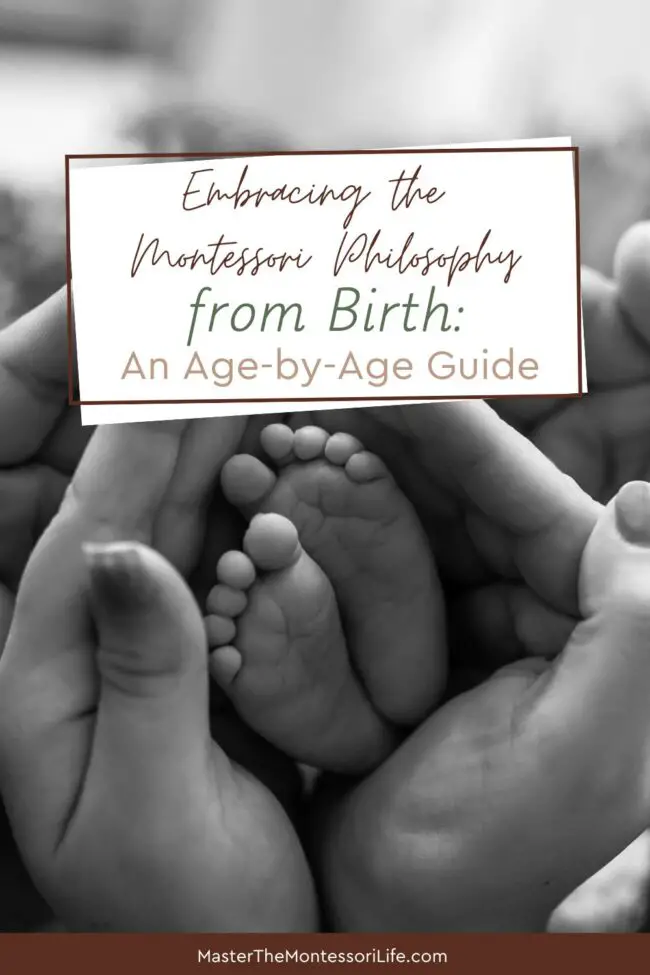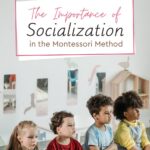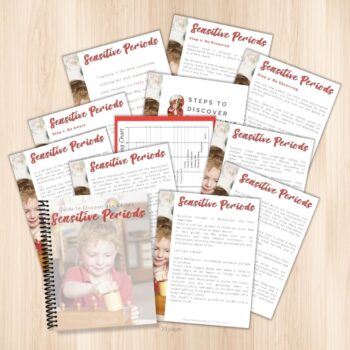Welcoming a child into the world is as thrilling as it is overwhelming. Embracing the Montessori philosophy from birth doesn’t have to be. Parents everywhere want the best for their children, and that starts from day one. If you can, preparing ahead of time will give you a leg up to accomplish just that.
The Montessori philosophy stands out as a holistic, child-centered approach that can nurture independence, curiosity, and lifelong love of learning right from birth. If you’re feeling unsure where to start or how to support your child at each stage, you’re not alone!
Read on to learn more on what you need to know to make it work for you. This guide breaks down the Montessori approach age by age and offers simple, practical steps to bring these beautiful principles into your everyday life.

Montessori from Birth to Age One: Fostering the Absorbent Mind
The first year of life is extremely full of new experiences and exploration of the world around. Dr. Maria Montessori believed that a child’s mind is most absorbent in the earliest years. This is your focus during the first year of life: their absorbent mind.
Infants learn by soaking in every detail of their environment, making it essential to create calm, prepared spaces that encourage exploration. Focus on gentle routines and simple, high-quality materials that invite touch, sound, and movement.
Montessori parenting at this stage means giving babies plenty of safe opportunities to move and discover. Simple tools like Nurturing your Montessori Baby Digital Book can inspire you with activities and confidence. For more on the impact of Montessori from birth, check out Why Montessori Matters from Birth The Impact on Infant Development.

The Toddler Years: Encouraging Independence
This is where things can get a bit more complicated, but again, with preparation, they don’t have to be. From ages one to three, children are eager to do things on their own. This can seem to be an intentional battle of the wills, but it’s developmentally normal. Learn to get the most of the positive aspects of it.
This is the perfect time to foster independence and a sense of accomplishment. Montessori encourages caregivers to slow down and invite little hands to participate in daily routines. Set up spaces where your child can reach their own belongings, pour water, or help with getting dressed.
Consider using practical life activities, like those featured in the Montessori Life Foundations Framework, to guide your days with purpose and joy. If you’re wondering how to create a Montessori-inspired space at home, the Transitioning Your Nursery to Montessori article has wonderful, step-by-step suggestions.

Early Childhood Years: Supporting Social and Academic Growth
As children reach preschool and early elementary ages, the Montessori philosophy remains a powerful ally for fostering social, emotional, and academic growth. Children thrive on respect for their choices, gentle guidance, and the freedom to explore subjects like math, science, and language arts in inviting, hands-on ways.
At this age, tools such as the Montessori Circle Time A Socialization Opportunity Digital Book and thoughtfully prepared curriculum materials can give both parents and teachers a strong foundation. Find ideas on how to keep your child inspired on the Master the Montessori Life blog.
Some parents decide to focus on the Montessori philosophy until the child’s age of six, but it doesn’t have to stop there. Consider prolonging this wonderful lifestyle by embracing it in your home as a family, even if you are not doing Montessori’s academic side.
Bringing Montessori Home for Every Age
No matter your child’s age, it’s never too early or too late to introduce Montessori principles into daily life. By creating supportive spaces, respecting your child’s independence, and offering quality learning tools, you lay the foundation for confidence and a lifelong passion for learning.
If you’re looking for expert guidance or ready-made resources, shop the full selection of Montessori digital books and printables and get started today. Together, we can make each stage of your child’s development joyful and meaningful!
You might also enjoy these relevant topics:
- Montessori from Birth: Why Start from Day One
- 10 Essential Montessori Toys for Your Baby’s First Year
- The First Year of Life: Developmental Stages and Key Milestones
- How to Start doing Montessori with your Baby
- A Comprehensive Montessori Guide for New Parents
- Strategies for Fostering Independence in Babies
Montessori Wooden Baby Toy Set – 6 Pieces of Rattles, Push Car and Newborn Toys for PgUp Baby Play Gym Wooden Baby Gym with 7 Toys, Foldable Wooden Play Gym Frame Hanging
PgUp Baby Play Gym Wooden Baby Gym with 7 Toys, Foldable Wooden Play Gym Frame Hanging hahaland High Contrast Baby Flashcards – Black and White Infant Baby Cards 0-6 Months Tummy Time
hahaland High Contrast Baby Flashcards – Black and White Infant Baby Cards 0-6 Months Tummy Time MORITECK Spinning Drum, Montessori Toys for Babies 6-12 Months, Infant Kids Developmental Wooden Toy for Boy
MORITECK Spinning Drum, Montessori Toys for Babies 6-12 Months, Infant Kids Developmental Wooden Toy for Boy Montessori Play Kit for 0-6 Month Baby Tummy Time Interactive Toys Baby Brain Development Toys Rattle
Montessori Play Kit for 0-6 Month Baby Tummy Time Interactive Toys Baby Brain Development Toys Rattle Montessori Babies
Montessori Babies
- Embracing Montessori Philosophy from Birth: An Age by Age Guide
 Welcoming a child into the world is as thrilling as it is overwhelming. Embracing the Montessori philosophy from birth doesn’t have to be.
Welcoming a child into the world is as thrilling as it is overwhelming. Embracing the Montessori philosophy from birth doesn’t have to be. - Explore the World with Montessori Landmark Cards
 The Montessori Culture Landmarks and Monuments of the World 3-Part Cards + Lesson Plan is your passport to global learning adventures!
The Montessori Culture Landmarks and Monuments of the World 3-Part Cards + Lesson Plan is your passport to global learning adventures! - How to Teach Addition with the Montessori Method
 Introducing children to addition can be an exciting milestone, especially when you use the Montessori method.
Introducing children to addition can be an exciting milestone, especially when you use the Montessori method. - Baby’s First Year: Applying Montessori Principles at Home
 Applying Montessori principles at home is not as daunting as it seems. By setting up a safe and engaging space, you encourage independent exploration and learning.
Applying Montessori principles at home is not as daunting as it seems. By setting up a safe and engaging space, you encourage independent exploration and learning. - Stay Organized and Inspired with My Montessori Planner
 Spread the love Are you a Montessori teacher, homeschooling parent, or simply someone who loves the Montessori method and wants…
Spread the love Are you a Montessori teacher, homeschooling parent, or simply someone who loves the Montessori method and wants… - The Importance of Socialization in the Montessori Philosophy
 In this blog post, let’s discuss the importance of socialization. Unlike many would think, socialization is an essential pillar of the Montessori philosophy.
In this blog post, let’s discuss the importance of socialization. Unlike many would think, socialization is an essential pillar of the Montessori philosophy.











